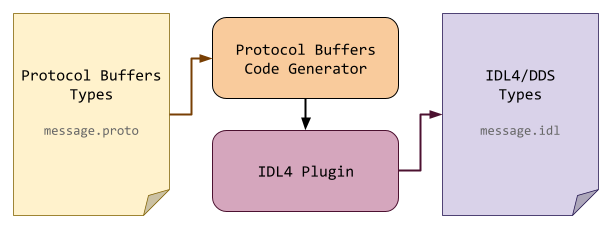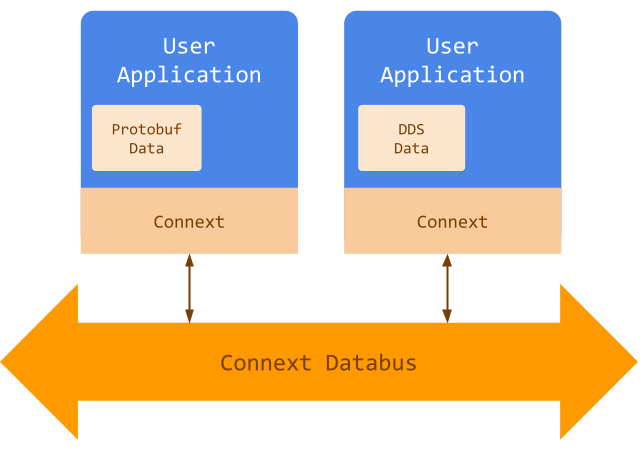1. About Protocol Buffers Extension
RTI® Connext® Protocol Buffers Extension enables the use of Protocol Buffers data types in Connext applications.
Protocol Buffers Extension is an experimental feature in Connext Professional 7.6.0. See Experimental Features in RTI Connext What’s New.
Note
Protocol Buffers Extension is currently supported only on Linux 64-bit Intel architecture.
1.1. Use Cases
Protocol Buffers Definition Language. Protocol Buffers Extension provides support for using
the Protocol Buffers message definition language to define the data types used by Connext applications.
Developers can specify data types in .proto files, and the toolchain will automatically map them to
corresponding DDS-XTYPES types, which serve as the foundation for communication over DDS.

Generation of Equivalent DDS-XTYPES Types. Protocol Buffers Extension generates .idl files
containing DDS-XTYPES types equivalent to the Protocol Buffers types defined in .proto files.
This enables easy integration between those Connext applications using the Protocol Buffers
data types, and those using the equivalent DDS-XTYPES types, regardless of programming
language.
Protocol Buffers C++ Language Binding. Protocol Buffers Extension allows developers to use the C++ message types generated by the Protocol Buffers compiler in combination with Connext’s “Modern” C++ API. Applications can create DataWriter and DataReader endpoints to exchange objects of the Protocol Buffers types directly over DDS topics. Existing components that use these types can be easily and efficiently integrated onto the DDS databus.

Integration with DDS. The data-types defined using Protocol Buffers are first-class citizens in the Connext platform and can be used just like any other DDS types. Full support is provided for features such as type discovery, type matching, type evolution, dynamic types, dynamic data, content filtering, and more.
The .proto files can be enriched with custom Protocol Buffers options defined
to control DDS-specific properties, such as indicating key members. Other options
allow developers to take advantage of DDS-XTYPES features not natively available in
standard Protocol Buffers. This enhances the integration of Protocol Buffers components with other
Connext applications.
1.2. Components
Protocol Buffers Extension consists of two plugins for the Protocol Buffers compiler
(protoc), and a set of DDS-specific options for Protocol Buffers types:
1.2.1. IDL4 Converter Plugin
The IDL4 Converter Plugin converts .proto files into equivalent .idl files:
protoc --idl4_out=<outputdir> message.proto
Example Input (
message.proto):syntax = "proto3"; import "other.proto"; package myapp; message MyMessage { int32 foo = 1; Other bar = 2; }
Example Output (
message.idl):#ifndef myapp_message_proto_IDL4_ #define myapp_message_proto_IDL4_ #include "other.idl" module myapp { @mutable struct MyMessage { @id(1) int32 foo; @id(2) @optional Other bar; }; }; // module myapp #endif // myapp_message_proto_IDL4_
Section Protocol Buffers to DDS-XTYPES Mapping provides a detailed description of the mapping between Protocol Buffers and IDL4 types.
1.2.2. C++ Code-Generator Plugin
The Connext C++ Code-Generator Plugin is used together with Protocol Buffers’s built-in C++ Code Generator to generate C++ classes for each data type, e.g.:
protoc --cpp_out=<outputdir> \
--connext-cpp_out=<outputdir> \
message.proto
Example Output (
message.pb.h, abridged):#include "other.pb.h" // Injected by RTI code generator #include "rti/topic/cdr/ProtobufInterpreter.hpp" namespace myapp { class MyMessage final : public ::google::protobuf::Message { public: MyMessage(); ~MyMessage() override; bool has_foo() const; void clear_foo(); int32_t foo() const; bool has_bar() const; void clear_bar(); const ::myapp::Other& bar() const; ::myapp::Other* mutable_bar(); void set_allocated_bar(::myapp::Other* bar); // Injected by RTI code generator template <typename MessageType> friend struct ::rti::topic::interpreter::detail::protobuf_message_access; private: int32_t foo_; ::myapp::Other* bar_; } } // namespace myapp
1.2.3. DDS Options for Protocol Buffers
Additional options are available to control the IDL4 types derived from the Protocol Buffers definitions. See DDS Options for Protocol Buffers. These options are defined using Protocol Buffers syntax and they can be applied after importing the associated .proto file (omg/dds/descriptor.proto).
Example Input (
message.proto, annotated):syntax = "proto3"; import "other.proto"; import "omg/dds/descriptor.proto"; package myapp; message MyMessage { option (.omg.dds.type) = { default_id: DDS_DEFAULT_ID, auto_id: HASH }; int32 foo = 1 [ (.omg.dds.member).key = true ]; Other bar = 2 [ (.omg.dds.member) = { optional: true, hash_id: "baz" }]; }
Example Output (
message.idl, customized):#ifndef myapp_message_proto_IDL4_ #define myapp_message_proto_IDL4_ #include "other.idl" module myapp { @mutable @autoid(hash) struct MyMessage { @key int32 foo; @hash_id("baz") Other bar; }; }; // module myapp #endif // myapp_message_proto_IDL4_